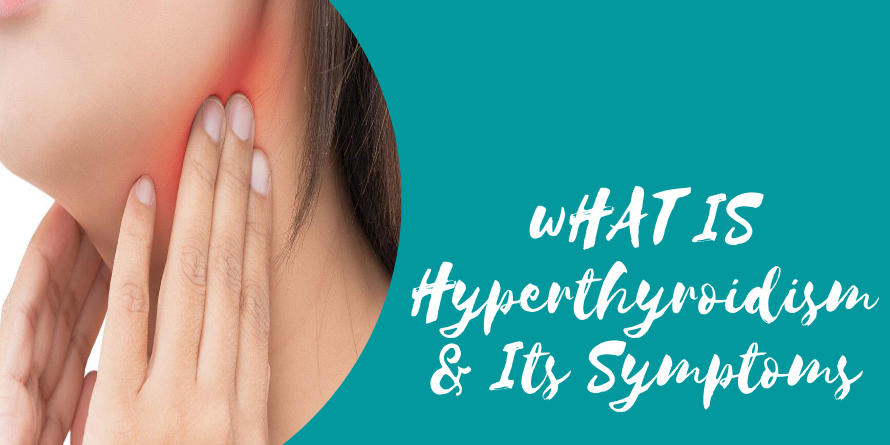Hyperthyroidism is a condition where the thyroid produces more thyroxine than is needed by the body. It is also referred to as thyrotoxicosis, or an over-active thyroid. It can occur if you have:
- Graves’ disease – the most common cause
- A toxic multinodular goitre (a goitre is an enlarged thyroid gland)
- A solitary toxic thyroid adenoma (an adenoma is a clump of cells)
- Thyroiditis (inflammation of the thyroid gland) when it is temporary and self-limiting
- It can also occur when too much replacement thyroxine (levothyroxine) is taken as a treatment for an under-active thyroid (hypothyroidism).
Hyperthyroidism leads to an increase in the body’s metabolism (energy production), often causing:
Weight loss, nervousness and irritability,palpitations/rapid pulse,sweating and heat intolerance, warm, moist hands,thirst,tiredness and weak muscles,mood swings or aggressive behavior, looseness of the bowels and occasionally nausea,passing larger than usual amounts of urine,itchiness,enlarged thyroid gland,thyroid eye disease.
Sometimes the symptoms are so mild that they go unnoticed for a long time. In other cases they come on suddenly over a period of a few days or weeks and are severe. Many of the symptoms will start to clear up when your treatment takes effect, but some, including thyroid eye disease, may need separate treatment.
Our Thyroid Specialists will helps you on this.
Graves’ disease is the most common cause of hyperthyroidism and is much more common in women than in men. Some patients with Graves’ disease have an enlarged thyroid gland (a goiter). The enlarged thyroid gland produces increased amounts of thyroid hormones, which cause the symptoms of thyroid over-activity. About a third of patients with Graves’ disease also develop eye problems, known as thyroid eye disease. The eyes may become prominent and feel gritty and sore, and occasionally double vision occurs. The presence of a goiter or involvement of the eyes should help your doctor recognize Graves’ disease.
By a physical examination and blood tests. If the thyroid-stimulating hormone (TSH) level is low – below the reference range – and the thyroxine (FT4) level is high – above the reference range – this usually indicates an over-active thyroid. Another blood test to measure the antibody levels (the ‘TSH receptor antibody’) in your blood can establish whether or not it is Graves’ disease. Rarely, your specialist may also do a thyroid scan.
Your treatment will depend on several factors, such as the type of hyperthyroidism you have, and the severity. In some cases the thyroid over-activity may settle down without any specific treatment when caused by thyroiditis. Your specialist will decide which suits your case best.
- Antithyroid drugs are often used as the first treatment and are the treatment of choice for children, and for women who are pregnant. The drug first used is Carbimazole (CMZ). If this causes you side-effects, or if you are or plan to be pregnant, Propylthiouracil (PTU) is used. It is important to continue to take your tablets every day, as forgetting to take them, will affect your blood test results and your health. You should not stop them unless advised by a doctor even if another illness develops. Smoking reduces the chance of a cure after a course of antithyroid drugs.
- Surgery is usually the treatment of choice for younger patients with large goitres, for those with severe disease, and may be considered for those whose thyroid over-activity comes back, after a course of antithyroid drugs. After surgery you may need to take levothyroxine for the rest of your life.
- Radioactive iodine is very effective, is safe and rarely causes side-effects. You usually need to take levothyroxine for life after radioactive iodine treatment if you have Graves’ disease, but not for as long if the cause of the thyroid over-activity is a toxic multinodular goitre or a solitary toxic thyroid adenoma. Radioactive iodine also shrinks the goitre.
- Beta blockers are tablets that are sometimes used in the first few weeks after diagnosing hyperthyroidism as they relieve some of the symptoms while waiting for other treatments (radioactive iodine or antithyroid drugs) to take effect.
- The hyperthyroidism associated with thyroiditis is temporary and settles down without any specific treatment. Beta blockers are helpful to ease the symptoms.
- If you notice yellowing of the eyes or skin you should see a doctor and ask for a liver enzyme test.
There is a very rare side-effect (agranulocytosis) of antithyroid drugs due to a lowering of the number of white blood cells.Therefore, if you develop a sore throat, mouth ulcers, rash or an unexplained fever, stop taking the tablets immediately and have your blood count checked urgently. In most cases it turns out to be a false alarm and you can re-start your medication.
Very rarely, serious liver injury has been reported in patients, including children, taking PTU, especially during the first six months of taking the drug. Your doctor should monitor you for symptoms and discontinue the PTU if liver injury is suspected. If you notice any yellowing of the eyes or skin you should see your doctor immediately.
Consult our dietician for a diet regime and take a look at this interesting article on turmeric use for thyroid




